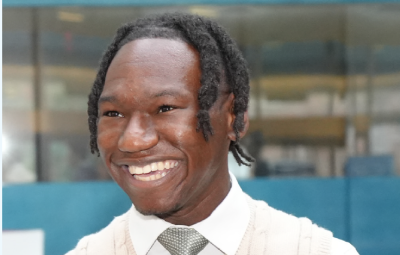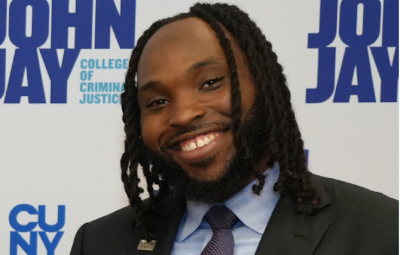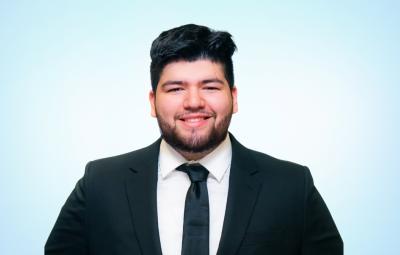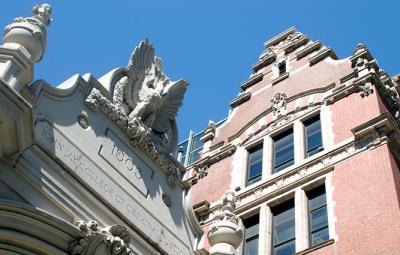
Danny Jamoul ’24: Future Doctor & Neuroscientist
Degree: B.S. in Cell and Molecular Biology
Mentors: Edgardo Sanabria-Valentín, Ph.D., Gloria Proni, Ph.D., Vishal Persaud
Programs: Program for Research Initiatives in Science and Math (PRISM), CUNY Inclusive Economic Initiative (CIE), Pre-Health Club
Internships: SUNY College of Optometry, Columbia University Department of Neurology
Hometown: Syria; New York, NY
Career Aspiration: Physician-Scientist
First-generation student Danny Jamoul ’24 is committed to fighting misinformation, creating a more equitable society, and empowering communities. He plans to accomplish this goal through science and medicine. “I see research as a valuable tool to improving people’s lives, especially in the realm of patient care,” says Jamoul, whose research was recently published in Neuron, a neuroscience journal. “We see inequities in our communities, in our institutions, and in healthcare. At John Jay, I’ve learned it’s in our power to make a real difference and research can do that. It’s why I plan to become a physician-scientist.”
What was life like before John Jay?
I’m a Druze American and the proud son of immigrants. My parents came to the U.S. from Syria in the early 2000s. I was born here and spent some of my early years in New York City. Then we returned to Syria for a few years where I went to elementary school. When I was around nine years old, the war broke out, and my parents decided to return to New York. There wasn’t much of an explanation regarding why we were leaving Syria, but looking back, it’s clear they were trying to shield me from what was happening. A lot of my family, as well as childhood friends and their families, fled the country and are now refugees all around the world.
What was the transition from Syria to the U.S. like for you?
It was a bit of a culture shock, but one I’m grateful for. Part of the joy of being an immigrant is juggling two worlds at once. You’re balancing the culture of your people and the culture of your peers and neighbors. Being integrated with many people from different communities, cultural, religious, and national backgrounds gave me a better perspective on life, deepened my understanding of others, and made me more empathetic. I was often invited to my friends’ houses for different religious and cultural traditions. Celebrating their differences has stayed with me in a positive way.
Why John Jay?
The justice aspect of John Jay’s mission really resonated with me. While I was in high school, there was a shift in the political landscape and public rhetoric. There was a ban on Syrians coming into the country. They were being called terrorists. So, it was really important for me to go to a college that would put me on a path to becoming a changemaker. I wanted to help change that narrative, whether that was as a lawyer or a scientist.
Initially, I planned to earn a law degree, but what’s beautiful about John Jay is that you’re allowed to explore different paths. When Covid happened, there was so much misinformation being spread. I remember wanting to learn more about the virus, and it led me to read scientific articles and take more science classes. That’s when I made the switch, choosing to pursue a degree in cell and molecular biology. John Jay is a real hidden gem for STEM students.
How has PRISM shaped your John Jay experience?
PRISM is a program like no other. It goes beyond just being in a lab, doing work, and putting it on your resume. It’s where you go to become a scientist. You’re learning to collaborate with the community, fellow students, and faculty. PRISM is about communicating ideas. The mentorship offered by the program is so transformative for students. I was very fortunate to have three incredible mentors—Dr. Edgardo Sanabria-Valentín, Dr. Gloria Proni, and Professor Vishal Persaud—who opened my eyes to a new world of possibilities. Dr. Ed is always there when you need him. He’s so good at seeing a student’s potential—often before the student sees it—and pushing the student to strive for excellence. Dr. Proni and Professor Persaud encouraged me to explore different research topics, present my ideas, read outside literature, and seek different resources. They also taught me how to present research so that it is exciting and engaging.
Were there any internships that helped shape your career aspirations?
Thanks to PRISM, I had a wonderful internship opportunity at the SUNY College of Optometry, where I shadowed doctors and physician-scientists. I was able to learn more about clinical and research work. It’s where I learned about physician-scientists and their role in improving patient care. I also had the chance to conduct research in a lab at Columbia University and authored a paper published in the neuroscience journal Neuron. The research was on how the retina develops. We’re hoping that some of our findings can lead to creating therapeutics for conditions such as diabetic retinopathy, which causes vision loss in people with diabetes.
What are your post-graduate plans?
I’m currently studying for the MCAT and applying to graduate schools. My goal is to become a physician-scientist, which means I’ll earn my M.D. and Ph.D. simultaneously, which is an eight-year endeavor. Beyond that, I’d love to be a mentor and help communities thrive, both here and abroad. It’s so important to stay grounded, remember your roots and where you came from, and help the next generation.



